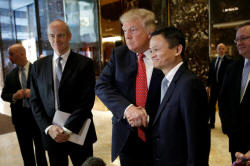|
Alibaba's Ma meets Trump,
promises to bring one million jobs to U.S.
 Send a link to a friend
Send a link to a friend
 [January 10, 2017]
NEW
YORK/BEIJING (Reuters) - Alibaba Executive Chairman Jack Ma met U.S.
President-elect Donald Trump on Monday and laid out the Chinese
e-commerce giant's new plan to bring one million small U.S. businesses
onto its platform to sell to Chinese consumers over the next five years,
an Alibaba spokesman said. [January 10, 2017]
NEW
YORK/BEIJING (Reuters) - Alibaba Executive Chairman Jack Ma met U.S.
President-elect Donald Trump on Monday and laid out the Chinese
e-commerce giant's new plan to bring one million small U.S. businesses
onto its platform to sell to Chinese consumers over the next five years,
an Alibaba spokesman said.
Alibaba Group Holding Ltd <BABA.N> expects the initiative to create one
million U.S. jobs as each company adds a position, company spokesman Bob
Christie said in a phone call.
Alibaba has previously campaigned to bring more small U.S. businesses
onto the company's sites, but this is the first time Ma has discussed
specific targets.
Trump and Ma emerged from their meeting at Trump Tower in New York
together. The president-elect told reporters they had a "great meeting"
and would do great things together. Ma called Trump "smart" and
"open-minded."
Ma said the two mainly discussed supporting small businesses, especially
in the Midwest, such as farmers and small clothing makers, who could tap
the Chinese market directly through Alibaba, whose Tmall online shopping
platform offers virtual store fronts and payment portals to merchants.

The company has in recent years been aggressively courting foreign
brands to set up Tmall stores to sell to China's vast and growing middle
class by offering to smoothen out Chinese sales, payment and shipping
processes.
Ma, a Chinese citizen, appears frequently with leaders from the highest
echelons of the Communist Party, and both sides have voiced their
support and admiration for each other.
Trump often targeted China in the election campaign, blaming Beijing for
U.S. job losses and vowing to impose 45 percent tariffs on Chinese
imports. He also promised to call China a currency manipulator on his
first day in office.
Alibaba has deep ties with the Chinese government, working closely on
some of the country's core technology development goals including cloud
infrastructure and big data.
"It's important, given the anti-China rhetoric that has been coming out,
to innoculate the company and himself from that." said Duncan Clark,
chairman of investment advisory firm BDA China and author of a book on
Alibaba, of Ma's meeting with Trump.
[to top of second column] |

U.S. President-elect Donald Trump shakes hands with and Alibaba
executive chairman Jack Ma after their meeting at Trump Tower in New
York, U.S., January 9, 2017. REUTERS/Mike Segar

"There's nothing to lose in talking about what they're trying to do here
which is stimulate demand in China," said Clark.
About 7,000 U.S. brands including wholesaler Costco Wholesale Corp and
apparel seller Levi's currently sit on Alibaba's Tmall, an Alibaba
spokeswoman said. They made $15 billion in sales to Chinese consumers
last year, she added.
But some foreign retailers have had mixed success on Tmall. In
September, the Wall Street Journal reported that luxury handbag maker
Coach closed its flagship store on Tmall. It quoted a Coach spokeswoman
as saying that they wanted to consolidate resources.
"It'll require a big effort," Clark said of Ma's prediction that the
platform could help create one million U.S. jobs.
"There's no one who could prove or disprove how likely that's going to
be," he said.
Alibaba did not mention whether Trump and Ma spoke about an ongoing U.S.
Securities and Exchange Commission investigation into Alibaba's
accounting practices. Trump's top choice for the incoming head of the
commission, Wall Street lawyer Jay Clayton, worked on Alibaba's initial
public offering.
The U.S Trade Representative last month returned the Chinese e-commerce
giant to an infamous list of blacklisted online retailers over concerns
that the company was not doing enough to stop counterfeiting on their
sites.
(Reporting by Peter Henderson, David Alexander, Doina Chiacu and Laila
Kearney in NEW YORK and Cate Cadell in BEIJING; Editing by Richard Chang
and Raju Gopalakrishnan)
[© 2017 Thomson Reuters. All rights
reserved.] Copyright 2017 Reuters. All rights reserved. This material may not be published,
broadcast, rewritten or redistributed.
 |